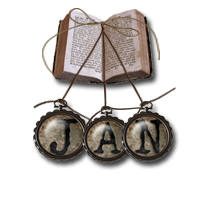When sixteen-year-old Tessa Gray crosses the ocean to find her brother, her destination is England, the time is the reign of Queen Victoria, and something terrifying is waiting for her in London's Downworld, where vampires, warlocks and other supernatural folk stalk the gaslit streets. Only the Shadowhunters, warriors dedicated to ridding the world of demons, keep order amidst the chaos.
Kidnapped by the mysterious Dark Sisters, members of a secret organization called The Pandemonium Club, Tessa soon learns that she herself is a Downworlder with a rare ability: the power to transform, at will, into another person. What’s more, the Magister, the shadowy figure who runs the Club, will stop at nothing to claim Tessa's power for his own.
Friendless and hunted, Tessa takes refuge with the Shadowhunters of the London Institute, who swear to find her brother if she will use her power to help them. She soon finds herself fascinated by—and torn between—two best friends: James, whose fragile beauty hides a deadly secret, and blue-eyed Will, whose caustic wit and volatile moods keep everyone in his life at arm's length . . . everyone, that is, but Tessa. As their search draws them deep into the heart of an arcane plot that threatens to destroy the Shadowhunters, Tessa realizes that she may need to choose between saving her brother and helping her new friends save the world. . . . and that love may be the most dangerous magic of all. (Publisher's summary from Powell's Books)
Clockwork Angel was my first novel by Cassandra Clare and I loved stepping into the world of the Shadowhunters. Clearly, Clare is a master world builder and I found myself lost in this my first journey into the steampunk genre. Her characters, even the secondary ones, were surprisingly effective in moving the plot forward adding layers that kept me reading and wondering what would happen next. I was especially taken with Jem whose even temper and caring loyalty to Will drew me to him like a moth to a flame, and I hope to find out more about him in the next book. I also loved Magnus Bane, a warlock and Camille, a vampire, whose roles in the story were pivotal. Clockwork Angel was a fantastic introduction to Clare’s writing and while I came to this book first before reading any of the Mortal Instruments series, I felt Clockwork Angel was a terrific introduction.
Final Thoughts: Clockwork Angel has a complex and engaging plot with well-developed characters. The setting is expertly described, and it is a fine example of the steampunk genre because of its use of automatons and other inventions. If you enjoy science fiction, action, and the paranormal then Clockwork Angel offers up all of this and more.
Their hidden world is about to be revealed....
When fifteen-year-old Clary Fray heads out to the Pandemonium Club in New York City, she hardly expects to witness a murder — much less a murder committed by three teenagers covered with strange tattoos and brandishing bizarre weapons. Clary knows she should call the police, but it's hard to explain a murder when the body disappears into thin air and the murderers are invisible to everyone but Clary.
Equally startled by her ability to see them, the murderers explain themselves as Shadowhunters: a secret tribe of warriors dedicated to ridding the earth of demons. Within twenty-four hours, Clary's mother disappears and Clary herself is almost killed by a grotesque demon. But why would demons be interested in ordinary mundanes like Clary and her mother? And how did Clary suddenly get the Sight? The Shadowhunters would like to know.... (Publisher's summary from Powell's Books)
Even before reading Clockwork Angel, I was anxious to start the Mortal Instruments because of some amazing reviews I read about this series, and I can firmly attest that I was not disappointed. Unlike Clockwork Angel, City of Bones is set in the present day New York where Clary, the strongly independent and city savvy protagonist inadvertently enters the Shadowhunters world with catastrophic results; the world as she knows it is forever changed. I loved that the action starts immediately and continues almost non-stop as Clare unfolds her plot with the precision of a fine tuned car. I was totally immersed in the conflict and emotions that Clare felt as she searched for her mother and tried to make sense of dealing with demons bent on killing her. Clare has an amazing knack for throwing surprises at her readers and City of Bones provides a real shocker. As in Clockwork Angel, I loved the characters and was pleasantly surprise to see Magnus Bane, the warlock from Clockwork Angel reappear in City of Bones.
Final thoughts: This is an exciting start to Cassandra Clare’s Mortal Instruments series. Her characters are believable, which helps to make the Shadowhunters’s world realistic too. The setting is vivid and detailed, and the ending only adds to my desire to read the rest of the series ASAP.
Final thoughts: This is an exciting start to Cassandra Clare’s Mortal Instruments series. Her characters are believable, which helps to make the Shadowhunters’s world realistic too. The setting is vivid and detailed, and the ending only adds to my desire to read the rest of the series ASAP.










































